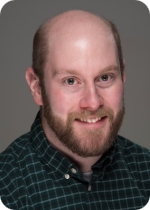Designing Research With Community Partners For Policy Impact
Rob Glover, Associate Professor of Political Science
What do you care most about in society? Where can we do better? What information and data do we need to make better decisions? If you could spend a year of your life undertaking research to impact policy and change the lives of those in your community, what issue would you choose?
These are the questions that students face in day one of my year-long “Practicum in Engaged Policy Studies.” Unsurprisingly, these high-achieving students generated a list that consumed two full white boards. Their enthusiasm was palpable, as was the sense that they were undertaking something unique and special in their undergraduate careers. But this was only the start of their journey.
This course is unique in that, from here, undergraduate student research teams collaborate with local, regional, and statewide community partners to co-design and execute research projects. As they work with me and their community partner on these projects, the students’ research injects original and valuable social scientific research into the policymaking process and strengthens our democracy.
Since its inception nearly a decade ago, my students have worked with a wide range of partners: local municipalities; elected officials; statewide policy research and advocacy organizations; and more.
While other research may begin with a question drawn from the academic research literature, my students begin their journey with a concrete need identified by a community partner. And while other capstone projects may result in papers or reports, students in this course can point to the role that their work played in shaping evidence-driven, responsive public policy in their community and their state. Quite literally, their work changes the world, leaving lasting impacts on the communities and stakeholders with whom they partner.
Our fourteen students are working with a range of community partners on equally varied (and ambitious!) projects. One team is working with the Maine Recovery Advocacy Project to conduct a first-of-its-kind statewide survey of those in recovery from substance use disorder, as well as what policies and programs would support their pathway to recovery. Another team is collaborating with the research and advocacy team at the Good Shepherd Food Bank to understand public knowledge and policy preferences of food security.
Our last team is focusing closer to home, partnering with analysts at the Maine Center for Economic Policy and the UMaine Office of Student Employment. They are examining the experiences of student employees on campus: what factors motivate them to work on campus during their studies and how their lives are impacted by the jobs they hold while attending university.
The experience is a challenging, but extraordinarily valuable and rewarding, one for students. Students learn about the institutional knowledge held by our community partners. Michael Delorge, collaborating to better understand substance use recovery in Maine, remarks on the unique opportunity to co-design and co-execute research with those in the community stating, “[w]e’ve learned a lot about how valuable a community partner can be in crafting effectual research.
Others are drawn to the skills and experiences they will carry forward from the course. Sean Staton, working understand food insecurity in Maine, notes, “The ability to explore and discern meaningful information on oft-neglected issues, and present that formative information to key community institutions that influence policy, is an incredible opportunity unique to this course.” Tamra Benson, working on student employment, shares that she’s “been given the unique opportunity to shape the world around us by researching problems in policy that we’d like to solve, which is particularly special.”
In the coming weeks, these students will be collaborating with stakeholders across the state to share their data, their analysis, and participate meaningfully in conversations about the road ahead on these challenging issues. From there, the real work will begin, as the students work will shape the body of knowledge that will drive policy decision-making on these challenging community issues for years to come.

